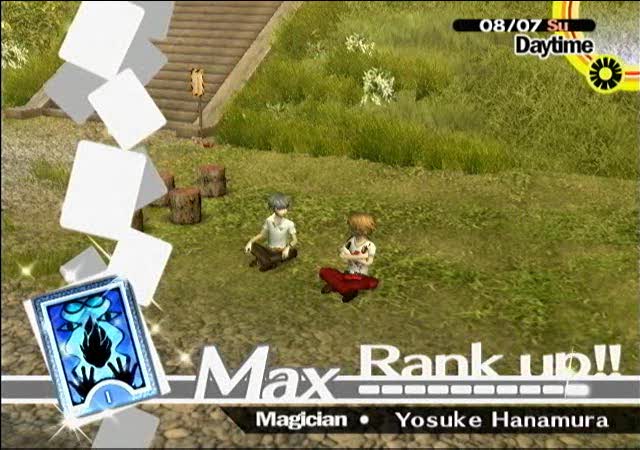
First off, since more people than I had anticipated didn't want to be spoiled, and others said they wanted to play this game after hearing my presentation, I have to say that I didn't get to any of the really spoilery stuff since I ran out of time, so if you plan to play the game don't go to the rest of the article after the jump. Just for the sake of people who may skim this opening paragraph:
SPOILER ALERT! END OF THE GAME DETAILS FOLLOW
Ok, since you're reading this, I'm assuming you don't mind spoilers.

The mystery component is that a series of murders start to take place shortly after the Protagonist arrives in Inaba (the town's name). Most of the game's story is focused around figuring out who the killer is, and why they are doing it.
First off, you probably want to know what a Persona is (in in-game terms), since that's what the game is named after, and anyone talking about the game will tend to use this term frequently. Well, I talked about Shadows in my presentation, and it turns out that a Persona is really just a Shadow that is under control. When people are thrown into the TV (or go in willingly), they often confront their own shadow. Most of the time, they argue with it, it transforms into a monster, they fight, and it kills them because a Shadow that has been rejected seeks to free itself to form its own identity. In the cases of the party members, they work together to beat Shadows that have gone out of control, and if someone is going to join your party, they will (eventually) accept their Shadow as a part of them, and it will transform into their Persona. As the hero (of course), the Protagonist has the ability to hold multiple Personas, and change Personas at will, which is an ability that could potentially be shared with Namatame (the kidnapper, who originally appears to be the killer, but is not), and Adachi (the real killer). This is never proven conclusively, though.

Social Link, GO!
The second thing you probably want to know is why I said that this is a game about relationships, when it's clearly a murder mystery. The reason why is that Persona magic and abilities are based on Social Links, and so are battle tactics. The stronger your Social Links, the stronger your Personas will be, and the more your teammates will help out in battle. In order to make your Social Links stronger, you have to build relationships with people in the town, and on your team. Each teammate has their own Social Link, and several classmates and townspeople do, too. So while you could potentially do nothing but train for battle and try to brute force your way to the end of the game (although I think you have to have at least one maxed-out Social Link in order to beat the final boss), it's better to spend two or three sessions leveling up in the TV world per in-game month, and using the rest of the time to build Social Links. If you don't build relationships, the game will become very hard, very quickly.
Under my Gender and Sexuality section, I omitted this next part because I planned to put it at the end and ran out of time, but there are some sub-themes to this that I hadn't mentioned yet. One of those is Izanami and Izanagi, who are subtly (and less subtly) referenced throughout the game, and first-time players will probably not even notice that the first Persona the player has access to is Izanagi (unless they are already familiar with Japanese mythology, in which case they probably would still not think much of it until later in the game). By the end of the game, it becomes clear that this was important, and it culminates in the (actual) final battle taking place between the Protagonist's party and Izanami-no-Okami.

Izanami, right before she shows you who's boss.
At the very end of the battle with Izanami-no-Okami, when she has just killed off all of your other party members (with at least one maxed-out Social Link), the Protagonist's initial Persona transforms into Izanagi-no-Okami, and defeats her by penetrating the mist that shrouds her (doesn't that sound familiar? Doesn't that also sound...Freudian?).
What makes this interesting is that it turns out that the Protagonist (and Namatame and Adachi) were all given their power by Izanami herself, for the purpose of determining humanity's true desires. That is to say, that without Izanami giving the Protagonist the ability to fight her, he never would have stood a chance. If she had just wanted to destroy humanity as a whole, nothing could stop her. While she is an antagonist (actually, the antagonist), she seems to genuinely care about humans, even though as a god she doesn't appear to understand them as well as she thinks she does. She even congratulates the party when they win the fight, although she explicitly promises that if she thinks she should interfere with humanity again, she will. To me, this is saying something, but I haven't yet figured out what. My research paper includes this topic, so I will be analyzing it more fully before completion.

Ultimate Persona, Izanagi-no-Okami (left) and Starting Persona, Izanagi (right)
No comments:
Post a Comment